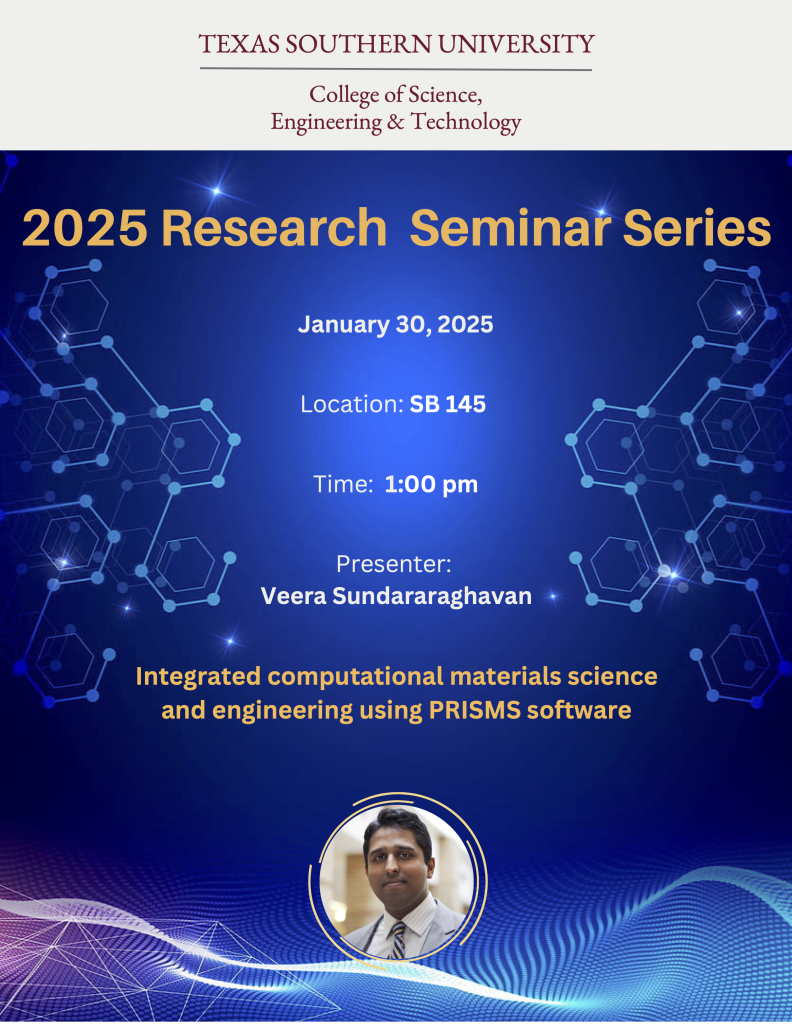or keep pressing Tab key no navigate
January 30, 2025
Location: SB 145
Time: 1:00 pm
Presenter: Veera Sundararaghavan
Integrated computational materials science and engineering using PRISMS software
Abstract:
The PRISMS team at the University of Michigan has made significant strides in advancing Integrated Computational Materials Engineering (ICME), an emerging discipline highlighted by the National Academy
of Engineering (NAE), which led to the large federal program called the Materials Genome Initiative (MGI). The Predictive Integrated Structural Materials Science (PRISMS) Center, one of the original MGI centers, continues the sustainment of critical codebase and data infrastructure that underpin our understanding of metallurgical sciences – from the atomistic to the continuum level. In this talk, I will give an overview of the materials science codes developed in the Department of Energy PRISMS center at the University of Michigan. Of current focus is the open-source parallel 3-D crystal plasticity finite element (CPFE) software package PRISMS-Plasticity includes well-defined pipelines for use with experimental characterization techniques such as electron backscatter diffraction (EBSD), Digital Image Analysis (DIC), and high-energy synchrotron X-ray diffraction (HEDM). The parallel performance of the software demonstrates that it scales exceptionally well for large problems running on thousands of processors. A machine learning approach has been recently added that allows large-scale analysis of process-microstructure relationships. The significance of our work lies in its potential to drastically reduce the time and cost associated with developing new materials, thereby accelerating innovation and enhancing the performance of structural materials in critical applications.
Dr. Veera Sundararaghavan is a Professor of Aerospace Engineering at the University of Michigan – Ann Arbor and the director of Multiscale Structural Simulations Laboratory. His research is on multi-length scale computational techniques for modelling and design of aerospace materials with a focus on microstructural mechanics (crystal plasticity, homogenization) and molecular simulation. He is particularly interested in new computational techniques that can revolutionize the way we compute in materials science: including machine learning and quantum computing algorithms. He received his Ph.D. in Mechanical Engineering from Cornell University in 2007, and Dual degree (B.Tech/M.Tech) in Mechanical Engineering from Indian Institute of Technology, Madras in 2003. He has published over 100 journal articles and has made important contributions in the area of integrated computational materials engineering (ICME) including reduced order representations for microstructure-process-property relationships, Markov random fields approach for microstructure reconstruction, and parallel, multiscale algorithms for optimizing deformation, fatigue and failure response in polycrystalline alloys. He has won several awards including the NSF CAREER award, the DTRA Young Investigator Award, Defense innovation award, and is an AIAA associate fellow and ASME fellow.
Light lunch will be served.
